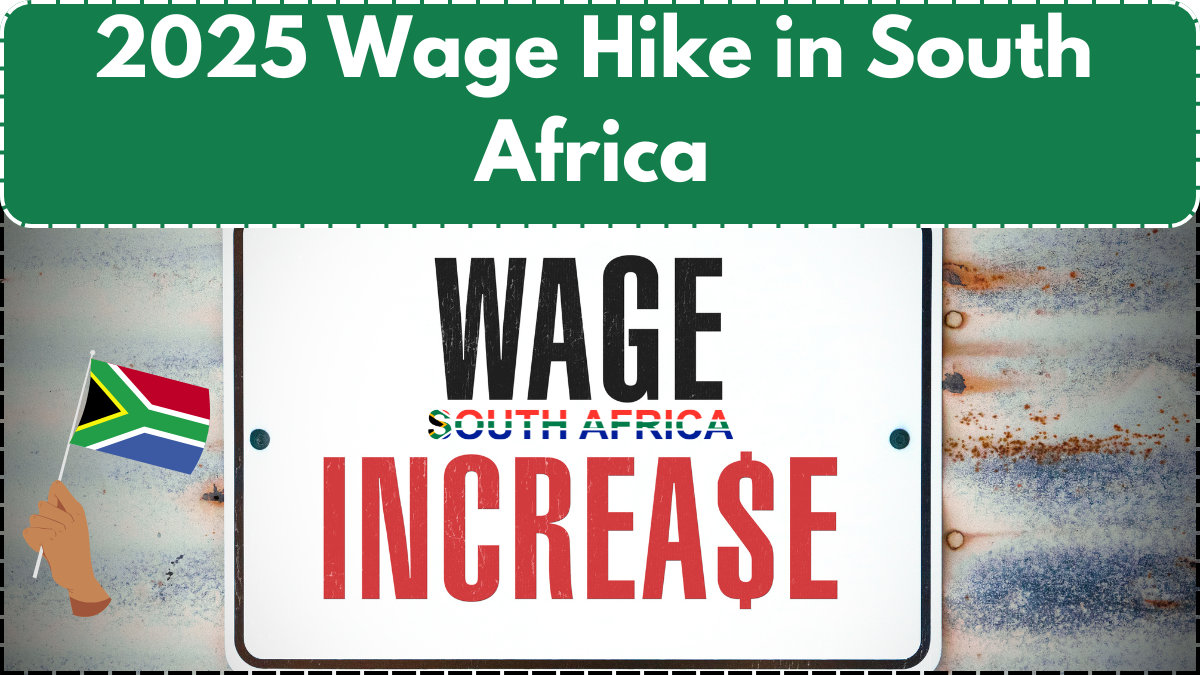South Africa has announced a significant wage increase for 2025, a move aimed at reducing income inequality and fostering economic stability. The wage adjustments cover various sectors, including the national minimum wage, public sector salaries, and additional employee allowances. This initiative is expected to improve the financial well-being of millions of workers across the country, thereby stimulating economic growth.

National Minimum Wage Adjustment
As of March 1, 2025, the national minimum wage in South Africa will increase from R27.58 per hour to R28.79 per hour, reflecting a 4.4% hike. This adjustment ensures fair pay, particularly for minimum wage earners. In U.S. dollar terms, the revised wage stands at approximately $1.55 per hour. This increase aims to keep up with inflation and enhance the standard of living for low-income workers.
Public Sector Salary Increase
Public sector employees, including teachers, nurses, police officers, and administrative staff, will receive a 5.5% salary increase. This negotiated adjustment is designed to attract and retain skilled professionals in essential public services. The revised salaries will take effect in April 2025, appearing in the first paychecks issued after the implementation date.
Enhanced Employee Allowances
In addition to wage increases, various allowances have been revised to provide further financial support to employees. Below is a detailed breakdown of these changes:
| Allowance Type | Previous Amount (R) | New Amount (R) | Effective Date |
|---|---|---|---|
| Housing Allowance | 1,784 | 1,900 | July 2025 |
| Transport Allowance | Variable | To Be Revised | Mid-2025 |
| Danger Allowance | 597 | 650 | March 2025 |
| Special Danger Allowance | 849 | 920 | March 2025 |
| Police Service Allowance | 700 | 920 | March 2025 |
The transport allowance will be reassessed mid-year based on fuel price trends, ensuring fair compensation for commuting expenses.
Private Sector Salary Adjustments
Unlike the public sector, wage increases in the private sector vary by industry and company policies. Adjustments are typically aligned with inflation rates and collective bargaining agreements. For example:
- Mining Industry: Sibanye Stillwater, a leading mining company, has agreed to a 5.5% wage increase for skilled workers and an additional R900 monthly increase for lower-tier employees.
- Retail, Hospitality & Service Sectors: Wage increases in these industries will be determined based on the Consumer Price Index (CPI) and union negotiations.
Employers in these industries are expected to implement wage hikes that align with the overall economic landscape.
Timeline for Implementation
The wage and allowance adjustments will be implemented over several months:
- March 1, 2025: National minimum wage increase becomes effective.
- April 2025: Public sector employees receive their first revised paychecks.
- March – June 2025: Private sector adjustments will take place depending on company policies and agreements.
- July 2025: Further revisions to housing and transport allowances.
Economic Impact of the Wage Increase
The 2025 wage hike is projected to have both positive and challenging economic effects:
- Boost to Consumer Spending: Higher wages will increase disposable income, leading to higher demand for goods and services, thereby stimulating economic growth.
- Estimated GDP Growth: Economists predict a 1.2% rise in South Africa’s GDP due to increased consumer spending.
- Challenges for Small Businesses: Some small enterprises may struggle to meet the new wage requirements. To mitigate this, phased implementation plans or government subsidies may be necessary.
- Potential Wage Inflation: If wage growth outpaces productivity, inflationary pressures could arise, affecting overall economic stability.
How to Determine if the Wage Increase Applies to You
To verify whether these wage adjustments impact your earnings, follow these steps:
- Consult Your Employer or HR Department: Your company’s HR team will provide details on how the wage increase affects you.
- Union Inquiries: If you are a union member, contact your representatives for specific agreement-related information.
- Government Resources: Check official government announcements at gov.za for the latest policies and wage structures.
- Company Communications: Stay updated through internal notices and salary slip revisions expected from April 2025 onwards.
Also Read: South Africa Social Grants and Public Wage Hikes 2025: Who Qualifies and How Much
Frequently Asked Questions (FAQs)
1. When will the wage increases take effect?
- The national minimum wage adjustment is effective from March 1, 2025, while public sector salary changes appear in April paychecks. Private sector adjustments will vary.
2. How does the private sector determine salary increases?
- Private companies adjust wages based on inflation, industry trends, and union negotiations.
3. Will there be further wage increases in 2025?
- Some allowances, like transport and housing, will be reassessed mid-year, but no additional general wage increases are confirmed.
4. How will this wage increase impact the economy?
- It is expected to boost consumer spending and GDP growth but may pose challenges for small businesses.
5. How can I check if my salary has been updated?
- Review your payslip, speak to HR, or check internal company announcements.
The 2025 wage adjustments in South Africa signify a major step toward economic fairness, benefiting workers across various sectors. However, businesses and policymakers must work together to ensure a smooth transition without causing economic strain. Staying informed will help employees understand how these changes affect their earnings and financial stability.
Click here to know more.
Akesh is a furniture expert with years of experience in design and craftsmanship. Specializing in sustainable materials, he shares his expertise to help people create stylish and functional living spaces.
